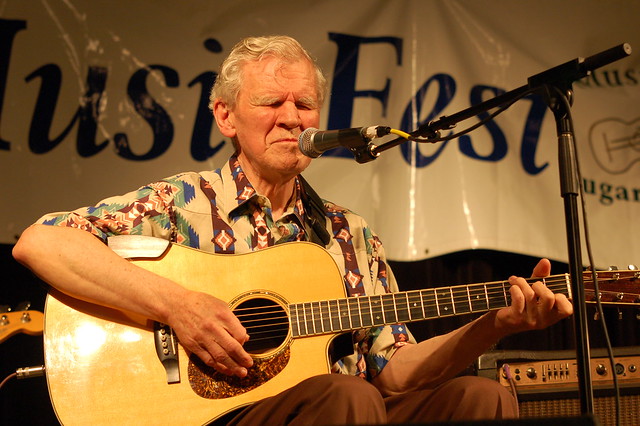
The late Doc Watson performs on July 11, 2019. (Photo by Joe Giordano)
Doc Watson was a musical giant. With a repertoire spanning bluegrass, folk, country, blues and gospel, his knowledge of traditional music was held in the highest regard. The seven-time Grammy award winner, and winner of a Lifetime Achievement Award, was considered a master of fingerstyle and flatpicking guitar. As was brought up at the “Remembering Doc” show at The Birchmere recently, he also had perfect pitch, and sung husky, rough-hewn vocals.
Doc, whose given name was Arthel, was hardly limited by being blind almost from birth. At The Birchmere on Sept. 8, Doc’s old band members shared stories of his handiness. He was a genius with duct tape, they said, repairing everything from the handle of a guitar case to the roof of a Winnebago. Truly impressive was how Doc wired his home for electricity. When asked how he did it, he replied that he could he feel a hot wire as well as anyone else.
T. Michael Coleman, who joined Doc and his son Merle as their bassist in 1973, came out to start the show. He had an old banjo. An audio recording of Doc played, explaining that his father had made the banjo, his first musical instrument in 1934. Michael got the crowd going by joking that Doc had told him that his father had made the banjo head from the skin of his grandmother’s old, sick, blind cat.
Michael played “Bonaparte’s Retreat” on the old banjo, a song that Doc learned from his father-in-law, Gaither Carlton. This is normally played on the fiddle, but Michael is a poor fiddle player, so he changed the instrument. Michael informed the audience that this is the only time that the old banjo will be played, and it’s being given to the Smithsonian. I was fortunate to get to hold this piece of musical history.
The next instrument Michael brought out was the guitar player’s dulcimer. He played one of his own original songs, “Sadie.” He then switched to guitar, playing a song that he said has brought him to tears many times, and included the line, “I’ll love ‘til the seas run dry.” Finally, he played one of Doc’s most famous songs, “Country Blues.”
Stream Doc Watson by Doc Watson on Spotify:
Michael introduced Jack Lawrence, a guitarist who played with Doc for 27 years, and left the stage. The first thing that Jack talked about was Doc’s spontaneity: He didn’t plan sets. Doc would talk through the first couple of songs, and the rest of his sets would be played off the cuff.
Jack started off with “Creole Belle,” a song by bluesman Taj Mahal. As a kid and a young adult, Jack had been into playing rock songs. Doc’s music was transformative for him. He spoke about playing Doc’s records, and wearing down the grooves on his guitar solos.
Merle Jack to join the Watsons in 1983. He met up with Doc in St. Charles, Illinois. Jack expected that, being new to the band, there’d be some kind of rehearsal. Instead, Doc told him the first two songs, and they simply got down to business.
Jack really enjoyed the old, traditional Elizabethan ballads, which Doc moved away from later in his career. A traditional folk song is built from any of a number of elements, he said: mother, cabins, unrequited love, and inadvertent pregnancy (which may cause a murder). The ballad “Georgie,” originally titled “Jordie” contains the elements of “unrequited love and suspected murder, but no pregnancy.”
Describing himself as a closet fingerstyle player, Jack said he would never do that with Doc — that was Doc’s territory. When he played with Doc, he used a flatpick. When it comes to vocals, he mainly knows the choruses of sings, because he sang tenor to Doc’s lead. It even freaked Jack out a little when Doc asked him to take over vocals on some songs after a few weeks on the road.
A big fan of Grandpa Jones, Jack thinks there’s a lot more to him just than the funny novelty songs. He said that there’s some great tragic romance in his catalog, too. He played “Raining Here This Morning,” eliciting applause for guitar work. “I can live with that one!” he exclaimed. Finishing the song, he nodded to his mistake, “If you’re not messing up, you’re not trying.”
Jack has a CD out called Arthel Guitar. Telling the backstory, he explained that, every year at Christmastime, they’d play a couple shows at the Down Home in Johnson City, Tennessee; that was their Christmas Party. Before the shows, Jack would pick up Doc from his home in Deep Gap, North Carolina, and he’d drive him back there afterwards. He’d stay the night, and he’d wake up before Doc. Doc’s wife Rosa would be awake and she’d have made coffee.
After his cup of coffee, Jack would go into Doc’s music room. In a dusty corner of that room sat a beat-up old guitar: the guitar from the corner of Doc’s albums from the ’60s. It was in really rough shape. As Jack was sniffing the sound hole, Doc came in and asked him what he was doing. Jack explained, and Doc told him that there was no music left in that guitar. Jack insisted that there was, and Doc said, “Maybe I’ll give it to you to someday.”
This continued for about for five years, until finally, one year, Doc said, “Oh, just take it.” Jack took the guitar and found to his dismay that it was in even worse shape that he thought. Nevertheless, he persisted and repaired it.
Around 1990, Jack was recording with Doc, and they laid down two albums. He played the repaired guitar through the entirety of the sessions. One day, he set it on Doc’s lap. As soon as Doc felt the neck, he recognized the guitar, and he started playing it. His face lit up with excitement. He told Jack that he’d been right, there had been music left in the guitar, and he shouldn’t have given up on it. Jack leaned over and whispered in his ear, “Maybe I’ll give it to you someday.”
Jack’s last song as a solo was one that Doc learned but didn’t get a chance to play before his death: The Byrds’ “Lover of the Bayou.” Michael came back out and they explained that, due to a medical issue with his wife, Wayne Henderson was unable to join them. Instead, they brought out special guest Dudley Connell, lead vocalist and guitarist for The Seldom Scene.
Jack played lead guitar, Dudley played rhythm, and Michael played bass. The trio played “More Pretty Girls.” Mentioning their wares for sales, Dudley joked that he had t-shirts for sale, but that they were just black Hanes three-packs.
Doc, they said, loved Jimmie Rodgers, so they played one of Jimmie’s signature tunes “T is for Texas.” Dudley got applause his yodeling.
After intermission, the trio came out together. Michael joked, “We’re here to torment you some more.” They started with “Long Journey.” The audience clapped for Jack’s guitar solo, and Michael interjected, “Perfect, Jack.”
Dudley shared a memory of Doc. He was at the Withlacoochee Backwater Festival in Dunnellon, Florida, and the Florida heat was absolutely blistering. Dudley’s band at the time had an old bus that, for all its flaws, was air conditioned. Doc didn’t have a place to cool off, and asked to come in. He proceeded to feel the window casings, and then identified the bus as a ’66 Silver Eagle.
Another story involved Doc riding in a car with Michael, Merle, Shel Silverstein, Cowboy Jack Clement, and Townes Van Zandt. Basically, Townes was being his typical drunken annoying self so, at 40mph, Cowboy threw him out of the car. Townes, of course, survived the fall — who knows, maybe the drunkenness helped? Michael sang his “If I Needed You.”
The trio played a few more songs: “Deep River Blues,” “Red Rocking Chair,” and “Summertime” before telling the story of how Doc was discovered. In 1960, Ralph Rinzler went to Union Grove looking for Clarence Ashley, and discovered Doc, who won the guitar competition. At the time, they described Doc as a rockabilly cat, who played a Les Paul despite having no electricity in his house. Rinzler, who was strictly a folk music man, was horrified, and steered Doc toward acoustic, old-time folk. Doc, seeing an opening to support his family, took it.
The proudest day of Doc’s life came when he returned a public assistance check because he didn’t need it. He took pride in supporting his family. Another story involved the band visiting fellow picker David Grisman in San Francisco. Doc, who rarely drank, had quite a bit of wine, while Jack partook of the herbal remedies that Dawg — a close friend of Jerry Garcia — had in ample supply. Leaving the party, each man insisted the other was too inebriated to drive, and that he should take the wheel. Doc, his former bandmates said, was a little heavy on the brakes.
“Tough Luck, Man” was described as “a lot like John Hurt’s blues, and they were kind of happy of happy.” Michael played a song about Doc and Merle, and the trio finished the evening with “Nine-Pound Hammer.”
Arthel Lane “Doc” Watson left us in 2012, but his memory and his music lives on through his bandmates, friends, and admirers.






